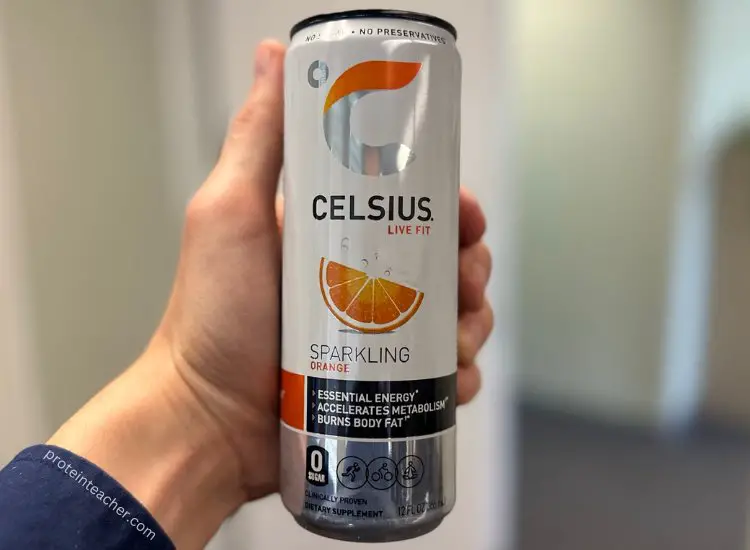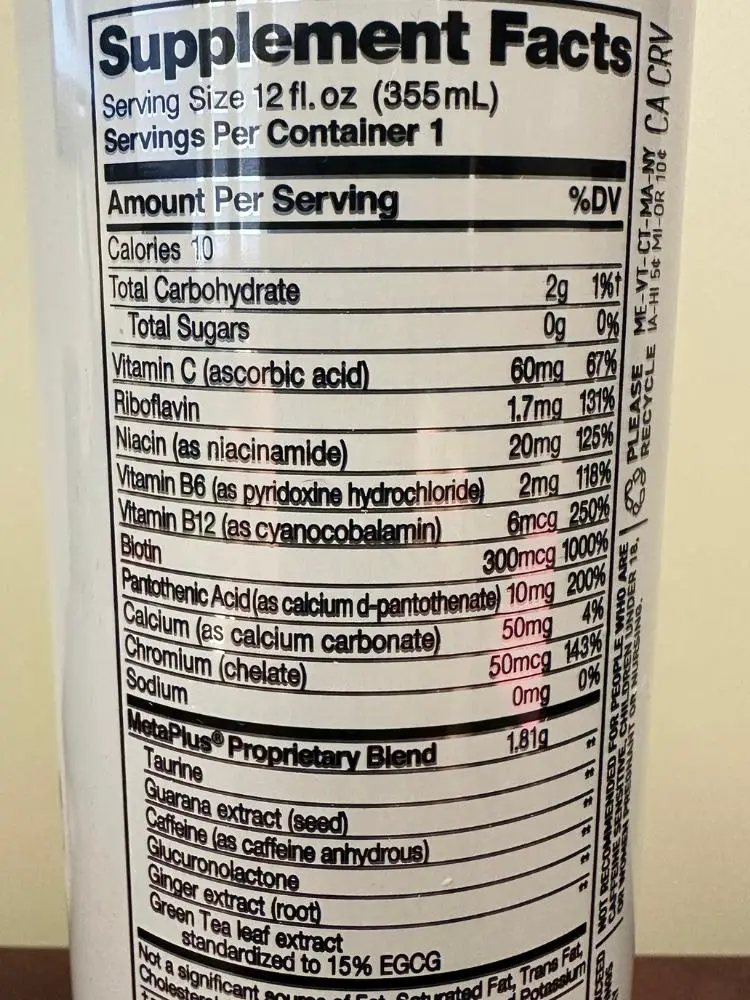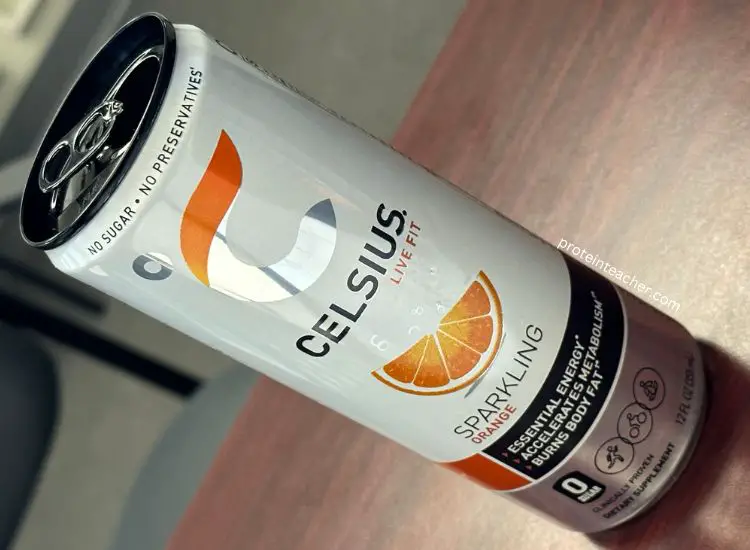Is Celsius Bad for You? (Nutritionist’s Perspective)
I remember when energy drinks first started becoming mainstream. This was way back in the mid 2000s when I was entering high school. Walking around the halls with a can of Monster was a status symbol.
Something about that bright green logo on a black background was appealing to us. We just couldn’t get enough of all that sugar and caffeine packed into a tall can.

But then adults started to take notice. Both parents and teachers realized that this popular energy drink could actually be harmful to young people.
This brings us to the modern era. Energy drinks have slimmed down and now proudly display things like “no sugar” and “no preservatives” on their cans.
Is Celsius Energy Healthy?
This raises an interesting question: is Celsius energy healthy or is it bad for you? I wouldn’t say that Celsius is a healthy energy drink (more on that below).
But consuming this beverage in moderation can be safe for some people. In general, I would recommend staying away from Celsius if you have a caffeine sensitivity.
Individuals who are at risk of cardiovascular disease could also be particularly susceptible to risks from sucralose and other sugar substitutes found in these energy drinks.
But drinking a can every so often (especially before a workout) is safe for healthy people. In the sections below I’ll dive into the ingredients and whether or not you should consume this beverage.
Celsius Energy Pros
- Zero grams of sugar
- No Aspartame
- No Preservatives
- Gluten Free
- Non GMO
- Kosher
- No High Fructose Corn Syrup
- No Artificial Colors or Flavors
The information above can be found on the label.
Celsius Nutrition Facts

| Servings Per Container | 1 |
| Serving Size | 12 fl. oz (355mL) |
| Calories | 10 |
| Total Fat | 0g |
| Sodium | 0mg |
| Total Carbohydrate | 2g |
| Protein | 0g |
| Calcium | 50mg |
| Vitamin C | 60mg |
| Riboflavin | 1.7mg |
| Niacin | 20mg |
| Vitamin B6 | 2mg |
| Vitamin B12 | 6mcg |
| Biotin | 300mcg |
| Pantothenic Acid | 10mg |
| Chromium | 50mcg |
| Caffeine Content | 200mg |
When checking out the nutrition facts, it seems like Celsius is a “healthy” beverage. There’s only 10 calories per can, no fat, 2 carbs, and no sugar.
However, it still has a high amount of caffeine per serving. There’s 200mg of caffeine in one can of Celsius. Compare that to a cup of coffee (8 fl oz) that has 95mg of caffeine.
But how much caffeine is too much?
According to the Food and Drug Administration, healthy adults can safely consume up to 400mg per day (about 4-5 cups of coffee). But this is a general guideline – as certain conditions can make people more sensitive to the side effects of caffeine.
A person can easily exceed this recommend level of caffeine by drinking multiple energy drinks a day. But drinking one can certainly isn’t dangerous – as long as your body is used this amount of caffeine.
Related: does Celsius burn fat?
Celsius Ingredients

- Carbonated Filtered Water
- Citric Acid
- Taurine
- Guarana Seed Extract
- Caffeine
- Green Tea Extract
- Sucralose
- Calcium Carbonate
- Ascorbic Acid
- Glucuronolactone
- Ginger Root Extract
- Calcium Pantothenate
- Niacinamide
- Natural Flavor
- Pyridoxine Hydrochloride
- Riboflavin
- Chromium Chelate
- Biotin
- Beta-Carotene (color)
- Cyanocobalamin
This brings us to another interesting topic – the ingredients. Celsius doesn’t contain any sugar, yet it still tastes sweet. We can figure out why after examining the ingredients found on the label.
Sucralose & Sugar Substitutes
The main thing to be aware of is sucralose. It’s a zero-calorie sweetener that’s about 600 times sweeter than table sugar. Studies have shown that sucralose can have negative health effects.
Researchers at North Carolina State University suggest that sucralose may lead to a leaky gut lining, increase the activity of genes related to inflammation, and might also damage our DNA.
Michelle Routhenstein, a New York-based heart health dietitian says:
“While artificial sweeteners may be tolerable in generally healthy individuals, they should be eliminated if there are any signs of bloating, indigestion, constipation or diarrhea.”
And if you are someone with a pre-existing heart condition, it’s best to avoid sucralose and other sugar substitutes commonly found in energy drinks.
Drinking Celsius Before a Workout
For healthy individuals, there’s nothing wrong with drinking a Celsius every so often. According to the company website:
“Studies show that drinking Celsius 15-20 minutes prior to your exercise or workout routine enhances the benefits of moderate exercise.”

That’s because sipping on caffeine pre-workout can make exercising feel easier and speed up recovery. Caffeine is a substance that stimulates the central nervous system and increases the rate that messages travel from your brain, to your body.
In other words, “You might be able to work out a little bit harder and not necessarily feel like it,” according to Allison Knott, M.S., R.D., C.S.S.D., a registered dietitian.
Final Thoughts
This article started with a simple question: is Celsius bad for you? The answer is more complex – as it really depends on the individual.
For the average person, there’s nothing wrong with drinking a Celsius once in a while. It can give you a quick boost of energy and benefit your body before a training session.
Celsius can be unhealthy for individuals with pre-exisiting heart conditions, due to the amount of sucralose found in the energy drink.
Studies have shown that long term consumption of sucralose and other sugary substances can lead to health conditions. People who are sensitive to caffeine should also avoid this beverage.
Related: How Much Caffeine is in Celsius?
